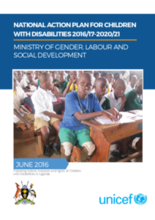Disability and children are high on both the Global and national Development agenda. The Sustainable Development Goals (SDGs); National Development Plan (NDP II) 2015/16 – 2019/20 and; the Social Development Sector Plan (SDSP1) 2015/16 – 2019/20 among others make mention of disability and child support.
Children with disabilities (CWDs) are among the most neglected groups in the policy domain as well as in the private sphere. The majority of these children face enormous economic, political, and social barriers that have an adverse impact on their physical, social and intellectual development and wellbeing. Many of them do not have access to the most basic needs such as health services and education, experience multiple deprivations even within their family and are invisible in national policy agenda. The African Child Policy Forum (ACPF) believes that revealing the realities and drawing attention to the life situation of CWDs is the first step to lay the foundation for the establishment of sound policies, strategic plans and effective services and support to CWDs in Africa (ACPF 2011; WHO, 2014; CAN 2015).
A study conducted on the situation of CWDs in Uganda by UNICEF and Ministry of Gender, Labour and Social Development (MGLSD) in 2014 indicated that, although the Uganda regulatory framework mostly domesticates the CRPD and CRC, there is need to clarify the measures to be taken and the responsibility of government institutions to realise the rights of CWDs. The protection mechanism of the rights of CWDs is also weak and existing laws and policies are not enforced to their full potential. Lack of coordination between national and local government institutions has led to uncoordinated responses to CWDs which led to the fragmentation of programmes geared towards addressing the needs of CWDs. The report also identified limited participation of various stakeholders who impact on the lives of CWDs including children themselves. It was also identified that huge gaps in knowledge, understanding and capacities of stakeholders, duty bearers and organisations working with CWDs were eminent which implied that the quality of services offered was compromised.
The report further identified negative societal attitudes present in the communities mainly associated with the traditional perceptions about disability. This has led to stigmatizing attitudes towards PWDs/CWDs consequently leading to rejection, neglect and denial of access to basic services. This in turn leads to marginalization of CWDs and their households within the community.
The development of the National Action Plan is to encourage government and other children’s rights actors to adequately plan for and respond to the holistic needs and aspirations of CWDs in Uganda. It provides for mechanisms of holistic inclusion and participation, stakeholders’ responsiveness, rights promotion, and, prevention, reduction and management of childhood disabilities among others. This National Action Plan therefore seeks to address the gaps in the past childhood disability response efforts and consolidate new developments and other emerging concerns on childhood disability in a comprehensive action framework.

